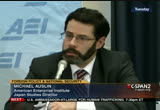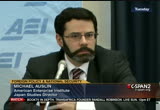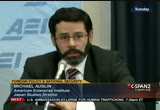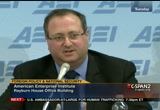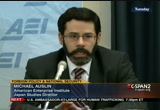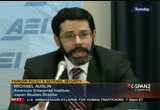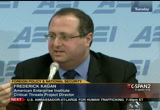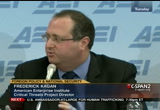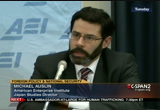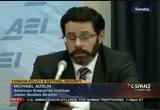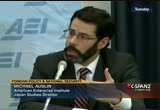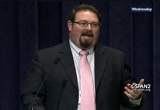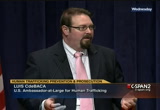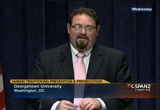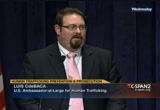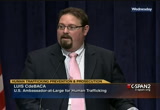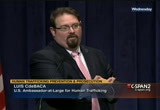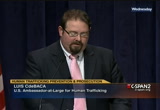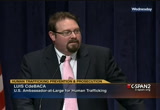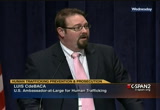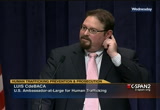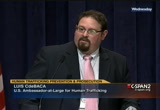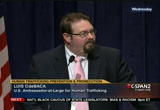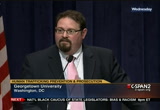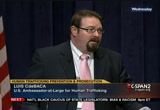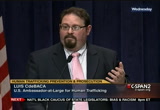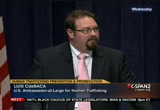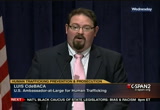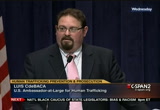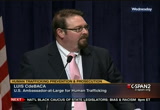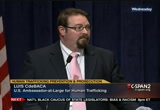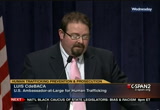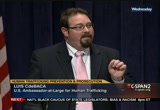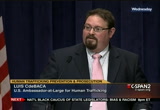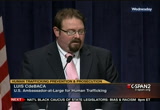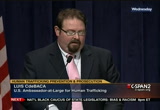tv Public Affairs CSPAN February 1, 2013 7:00pm-8:00pm EST
7:00 pm
how china will surpass us. he said that in the florida senate in 2011 and how we need each other. but that's diplomacy comest you can get a bit of a pass. senator hagel, key was had by the executive commission on china, but talk solely about development issues. rule of law and economic growth is fine. but that's not the job he's getting. he said absolutely nothing about the rise of china. he's also said absolutely nothing about he has had the defense department is going to do with the rise of china in an era of budget cuts to the defense department he supports. it's very troubling, fred has a great way of putting this consensus reality that in a sense it doesn't matter. so did not do the job better and you can take that for granted. japan for the first time in a
7:01 pm
decade has not just her and run defense budget, modestly $1.6 billion increase. it would be nice to see it continue, but everyone watches very carefully to see the leading indicator, which is us and what we're willing to do. taiwan is a country rushing to the exit to make sure nothing comes between it and china and therefore i would argue the same credibility over whether the united states would intervene and i taiwan strait scenario, but we can expect the support and could even see treaty allies that would be required, for example, logistics and the like want to stay out of it because they question whether we are committed to it and it said it would drag them in and leave them exposed to the situation in which stability had to start good to conflict and violence. >> just really quickly because fred's comments reminded me of a
7:02 pm
concluding remark i wanted to make in the opening statement, but it's important to bring us back to the larger political discussion. not only are we failing to manage the world in a way that will leave our children with a safer environment and judging by the faces and looking at you people, with a been a lot of work for you to do. but we're leaving many last name to deal with it. and not just because we demobilizing after a war, even if you accept that paradigm. it's because the money is going to entitlement programs. the money you might want to be mobilized to defend yourselves of the future is going to be in my baby boomer retirement health care accounts. we can either try to do it then,
7:03 pm
take away entitlements in a crisis circumstance or governor appetites now so sunday we wake up and discover the world remains a dangerous place and we have to do something about it that involves using armed force that we can then mobilize their wealth to do that. we are setting ourselves up for circumstances in the not too far distant future we should be much, much harder and historically unprecedented situation to be in. >> let's open up questions. forgive me, but i don't have a mic to hand around, so repeat your question so it's audible for the audience as well outside. the shaman nisi handover here. [inaudible]
7:04 pm
[inaudible] >> the question as to the criticism of the obama administration on its actions in a variety of al qaeda firm somalia, yemen was persuasive. but what's the right answer? >> well, i don't have a right answer and there isn't a right answer for any of these various places, but i think we need to get jan in review of troops on the ground cumin no troops on the ground in the situation here. i do think it is in our interest to find a way to work with local partners in order to combat local groups and allow them to cover their territories with their own forces. unfortunately, the way to do that involves putting boots on
7:05 pm
the ground. we have a long tradition. it was started by a democratic president who is enthusiastic about this kind of thing as john f. kennedy and this is one of the things the special forces were created to do. it is a train and advise mission and its enabled mission. if we had been doing that in yemen, we would in a somewhat better place. the questions are what do you do where you don't have partners where they can succeed in what he thought the escalation ladder and are you drawn into a war in every place? the answer is you don't want to be a know-how to make our decision in each case about the risk of going down one path or another. so it's got to be contingent. it can't be ideological, which is a highly ideological in the opposite direction from the bush years. now will never put troops on the ground to advise and assist and
7:06 pm
train our allies. you can't allow yourself come you can't allow your brain to be short-circuited by slippery slope arguments. we always live on a slippery slope. the question is making the right decision and you really can't make the decision honestly until you see concrete choices in front of you in each case. [inaudible] >> -- talk about issues in the western has here come the cube cuba, venezuela, and stability from the drug cartels in mexico. >> questions about the western hemisphere, something i didn't even touch on, i made that went unmentioned, seanez, and the instability from the drug cartels. can you talk about that, tom, a little bit? >> this is going to be in on economy of force response, the first of all, you know, other
7:07 pm
than actual physical defense, the cotton on the united states or legal united states has been our principal security interest since before we were a nation. it's clearly a moment in time and of course through history, gone back and forth between regimes in that area. and we have a lot of partners with whom we could be working. our model partnership with columbia, which has been a pretty low-level thing, but one which the house of representatives has traditionally kept very close tabs on his same model counterinsurgency partnership. if we had that model in some other middle east engagement, we would've been much better off also today.
7:08 pm
but it suggests again it's possible to work with the brazilians, for example. princelings were the leading force in the u.n. issued in haiti. so some good things have been happening, even why the cartel breaches have been hot and very serious threat to the civilians in mexico, so absolutely. likewise it's going to take a traditional approach that there's no doing this on the cheap. >> that part of the problem at this table, roger noriega is not this table. latin america, western hemisphere doesn't get addressed unless his latest shot is how. castro lives or dies, seanez lives or dies. maybe an election in venezuela or iran purcell, but that is what makes the newspaper and
7:09 pm
that's part of the problem. it's also part of the challenge to congress. a big part of the answer to every single question is you can't beat something with nothing. if you want to be to construct that america must retreat and disengage from the world, which is the one embraced radio button administration, you've got to be for something and that means capital hill. if much much is it better to lead astray from the american enterprise institute, were not capable of doing that. that's a historic reality. in the 1990s when bill clinton said there's an election based on that, it was the house and senate that legislative sanctions on iran, the push for, like it or not, freedom for the iraqi people to push for sanctions on cuba, to push her more engagement and exactly which are talking about, that
7:10 pm
really pushed for in a relationship with india. i could go on and on. nato expansion. all the things taken for granted but not in initiative. they're members of congress on capitol hill who change the world in a very meaningful way and that's still an opportunity if we recognize we need to care about. sorry for that little speech. >> how do we know kind of the counterterrorism, is very much her? [inaudible] >> the question is how do we know when we've won? >> were in no danger of women anytime soon. this has become a sugarless because it's a fair question
7:11 pm
obviously. what you measure for success and how do we know when we stopped, and that we are so far away from that now a more further away than when this president took office in the policies he's recommending will take us further and further from that because until we can start measuring the hectares covered by al qaeda affiliate, i guarantee you a question of whether we've won or not is nonoperative and right now the measurement is on the increase rather than decrease. so it's a fair question, but we need to recognize where we are in history. this is more like stalingrad 1943. hopefully we'll stop retreat here and at that point, the soviets were not thinking so much about what kind of peace they were going to impose on germany when they were done. they're rethinking how to
7:12 pm
recover the ground it lost in their own interest and that's where we are now because it was so much ground were about to lose so much more that that is the conundrum that faces us now. >> i do think there's an answer that if you look back, we were planning an iraq in the search after 2007, but winning is not just a game in the playground. it's not just a thank you very much welcome here now. winning requires maintenance and when you choose not to, it's very easy to go back to losing again. the implications may not be obvious to later, but they written a great deal on what the implications of having to live in iraq have meant for the stability of the country and for our own national interest in the national interest of our allies in the middle east. yes, sir.
7:13 pm
[inaudible] >> what would were between japan and trip japan and china the click click >> i can make conventional and unconventional. i didn't think it would be a warlike 1930s. i didn't think it would be nice if they follow were. first of all, i think will happen is they're going to be an accident. the japanese have sent at their fighter patrol jets. the chinese have responded, japanese firing warning shots. that would be inactive were to do that. you have the coast guard and maritime patrol vessels of china jockey with each other, bumping into each other. somebody's going to die.
7:14 pm
it's going to be an accident of some kind in an bp three events. and that's a question of the rules of engagement each side has. japan is a treaty ally, so what we do now is the assistant secretary of state was sent there last week along with the head of a ship for the national security council and the ast handles asia and department of defense telling the japanese to calm down, not to push too far. when we read that in the paper, you can be sure the chinese read it as well interpret they have more leeway to push on these things. said a conflict can be any type of conflict, but it's highly militarized small area right now if something happens, but the japanese do? today after consultations with the u.s., which would certainly regard as an escalation. to invoke article v of the
7:15 pm
security treaty and ask for help in self-defense? what do we decide we're going to give them? rightfully scared forces out of that immediate area. the credibility of the alliance is on the line. we say that a lot, but the japanese have enticed a number with taiwan and china for several years now and if we did not back them up at a time when japanese military lives are being lost, then release are forward base base in the pacific and from that aren't tired strategic linchpin from others. [inaudible]
7:16 pm
[inaudible] >> the question is a bacteria and what the united states should do. he suggested at the beginning next year is one of the better developed countries in the middle east. syria has never been one of the better developed countries in the middle east. baptism is socialism and socialism doesn't work anywhere, least of all the place with no natural resources in state-owned industries. said syria was not doing well at all prior to the up week of the civil war. the problem is that there's no good exit option in syria. there is no good outcome here. this is the argument underpins everything we've been trying to say here, which is in the beginning been a problem, it's always easier to solve it. it may not come out pop tamale.
7:17 pm
you may not get an a or b. answer or even ac answer. now all you can get our asked answers because the decision by the united states not to involve itself in the obama administration, not to involve itself in the searing conflict has done exactly what we promote, what fred talked about in libya, that it has subcontracted policy to qatar and other countries who do not have the same taste in rebels that we do too but not too fine a point on it. so when you look at blowback from libya and i see yourself, why is it to people with whom we are now defending him against whom we are now defending ourselves in benghazi or others or weapons have fallen out by such islamist extremist clerics the answer is because those who would like 92 as and chose to
7:18 pm
act against gadhafi, choose to act in a way that's anathema to us. we are lucky because of our limited involvement that we have a government there that is a moderate government, a government of people that try to pull ambassadors meeting murdered rather than push them into one. the world will see in syria this opportunist islamists extremists groups and other local groups have come to the forefront. they are well armed and so a rebellion that began as one at least in part secular and had no religious basis and was brought together by universal opposition to bishara lessard is not infiltrated by all sorts of al qaeda and related groups. so when assad files come as a question, when assad falls, what will be left is a well armed
7:19 pm
seething feuding mass on the border of iraq, turkey, jordan, lebanon and israel. it is as if we live in a sand as the world to think the implications of the conflict have absolutely no meaning for our national security. it's a disaster and what we can do now is try and contain a disaster and hasten the movement of assad out and ensure whoever is in charge actually is a group or a group of groups that respects and values the kind of values we have rather than the values that qatar has. my colleagues want to add something. >> this is also the case where we pay the price for having persuaded ourselves that iraq was a country located somewhere on the man and doesn't actually
7:20 pm
share common borders of any place on the earth that is of any significance to us. because we adopted that approach because secondarily the frustration decided that moore, lecky was her best friend and the guy we needed to back it all cost, the result is iraq has been feeding the situation is syria in two ways. one is iranian weapons and various other things have been traveling through iraq on the way to support the assad regime is that murders people in the al qaeda organization in iraq was supported from the outset by a logistics base and so forth that if god had allowed to exist in syria reverse polarity and has been exporting back in a serious radicalizing the movement from iraq. now we see continued spillover into a back of the sick tyrian bonnet, but the restraints made of the al qaeda franchise in
7:21 pm
iraq. so it's time to recognize that iraq and syria share a common order and the tribes across the border to talk to each other and the highways that go between those two countries carry terrorists in both directions. what we are now seen as a problem that will begin to expand exponentially as the al qaeda groups and affiliate both countries try to strengthen the fact they are gaining in both countries have been supported by the coteries and others in both countries that we are providing no support, played no role whatsoever. >> just really quickly. you've got to even open up the aperture a bit more. this source open in a regional contact defined by the u.s. withdraw. 2008 the u.s. was in a really very strong position. nobody liked us, but they don't like us now either. but our actual power in the
7:22 pm
region was at an historic high water mark. they were collapsing from iraq to afghanistan. many situations just taking a pass on actively and syria being the number one. the other engagement involvement that we did pursue libya is not to recommend nation. i'm not sure the assad regime is going to lose. the ray nance will help the regime last a lot time. the russians and chinese will defend them internationally if not resupply them and at some point they'll go up, not down. you have a middle east where the u.s. has increased and blocks contending for power. the arabian, steering with great power sponsorship from russia and china in the sunni increasing phalluses part of the
7:23 pm
region which will maintain some sort of alliance with united case, but not one that will be able to direct as we have up to 2008. so this could turn into some name, a really ugly very rapidly. >> that's only if you think 80,000 people dead is not ugly. yes, sir. adding a mac >> foreign-policy and especially security systems. this is another area where congress really has a role to play. the administration is basically decided that mohamed morsi at egypt is the new mubarak. the guy in the seat we will now help. it's completely indifferent to what our aid program should look like and what the desired outcome and egypt should be. the only thing they appear to be
7:24 pm
interested in is the continuation of the israeli egyptian camp david accords, which are obviously of great interest, but not really the only thing they should animate us and we talk about the largest country in the middle east. when i thought we were delivering fighter jets to the egyptian military, i just asked myself, what message does this send? the rule should be not the foreign aid is bad and not that foreign aid is good and not that military assistance is good or bad, it is the u.s. taxpayer dollar used to further u.s. tax your interest and every time a new government comes into power, we should take that aid down to zero and build it anew. does that mean we should give everybody the same as before? maybe it does. does that mean we should give them zero? could be.
7:25 pm
does that mean we should give them more? also a possibility. the autopilot is unconscionable and that's the problem we have now is where an autopilot. i'm not talking about the contract stopping building whatever sewage plant in whatever country. obviously things are going on in pipelines in our foreign aid. the issue is the message we send, that we become hysterical. our aid must end and the answer is no, don't do it based on that. obviously that's an exit poll. they should be based on a whole array of questions relating to where the flaw, treatment treatment of minorities, economic raise, action towards allies. all of those things are known factors and it seems as everybody is sending better to do than have an aggressive oversight hearing on the question at egypt. take it down and nothing to build afresh. sorry, i have very strong
7:26 pm
opinions on that question as you can here. >> agreed entirely with that on the sometimes i think we get caught up in the focus on our values, which is important in our age should be reflecting immense unshaved advancing values. why do we care about the welfare of individual egyptians are about these other things. we care because he speaks directly to the egyptian state of the long-term and the ability to govern in peace and control territory and deny the territory of popular support to our enemies. that's why we do for me these days am part of the problem is when foreign aid was crafted originally put under control of state department has seen as a form of public diplomacy in the overall context we were going to show what great guys who where
7:27 pm
and win hearts and minds this way. it should become something else beyond that. we have a fundamental interest in helping states threatened by the infection of al qaeda or the cut scores or hezbollah. we have a fundamental interest in helping states govern effectively and in the rural world, our values are embraced. so that government requires not using f-16s against people, not machine-gunning them to death, allowing elections to perceive in an open and honest way. this is not a question of we think everyone should be like us. this is a question of whether you want states to be stable in the world or whether you want the road to be a chaotic hotbed of opportunity to embed themselves in alienated and fragmented societies. >> another question?
7:28 pm
yes commissary. [inaudible] [inaudible] -- as opposed to looking more at nonstate at dear terrorist groups. >> can you repeat the question and answer a quick >> to question his intelligence in the pit and the cia and will it be more state-based rather than looking at nonstate actors and that sort of thing. i have heard that much about it. in general we are state-based now. the question is every state-based enough? anymore in this -- an enormous amount of territory to cover. you've got north korea. you've got the strategic waterways such as the malacca
7:29 pm
strait. you've got the south and east china seas and then you getting territory towards qualm, our territory. in recent years there's been expansion in the indian ocean. we at diego and that's really about it. we aren't using a lot of the means that we need out there such as autonomous vehicles to do high-level surveillance. mid-level surveillance without a fire scouts and other things out there in the numbers we need. but we haven't done is pushed our allies and that's one of the things we should do is pushed. come to south korea and others to begin sharing amongst themselves. there is a bank whether or not it's true, but it certainly seems to be at least a valuable or urban legend. when we find out --
7:30 pm
[inaudible] >> it's the grey, it's getting to me. what we find out about a new chinese tax up off of google earth as opposed to a traditional process come you have to raise the question of how much we see the types of things we need to see. that doesn't get to the question of human, what networks we have on the ground, how we work with allies who are concerned but i think the best analogy that most of our allies in the asia-pacific hurt concerned with front yard and their front door of a to the street in intersection, they're not concerned about the troll and intersection. they want to make sure no one comes in around eight and it's a problem because we have presumptions that a lot of the reasons we had the treaty with japan, were not worried about an amphibious aid in japan.
7:31 pm
it's hard to drive the mayor. so that's the type of things that need to focus on, which goes towards building a community of interest we can leverage another race. >> are going to wrap things up. let me take my colleagues of you and the rest arrested at the policy series. we've got health care on tuesday, economic realities and priorities on wednesday. financial services on thursday in case you didn't have enough, pulling up outlook opinion on friday. if you really just didn't get enough of national security, join us tomorrow. this got a terrific event at aei cop watching "zero dark 30" with the cia. it's not part of the series, but a national security event. with that, let me thank all of you and we are closed. thanks. hot mark hot mark
7:33 pm
>> the ambassador at large for human trafficking at today's modern-day slavery. during the symposium on trafficking earlier this week. it's about 25 minutes. >> when you start by saying how grateful i had to be here to speak today. i wish i could have been in the audience all day because of the lineup was very formidable i hope i'm not going to be too repetitive of folks. if i am repetitive, think of it as an indication on how her whole of government approach and the obama administration is working because we are saying the same things. some contradictory to what the
7:34 pm
folks at doj or dhs and other parts of government, then we'll talk later the notion of lifting a thousand voices and having innovation. either way i hope will be covered. i want to thank the dean. carol lancaster has been a real supporter of the work, not just through vital voices and other organizations who supported throughout the years, but by making sure these issues of human trafficking, on represented an underrepresented in this part of foreign policy and that's one of the things we see at georgetown as i walked up a flight of stairs to write down a flight of stairs i pointed out to just the three taken it a a little too far when i thought that notion of having to work hard for knowledge. at the same time it is the best
7:35 pm
and for those of you who don't own me already, i am proudly coming from a catholic social justice tradition, so that notion of taking both the breaker and hard work, but also incorporating values, not just into life i try to lead, but also in the policy of renowned, just as i try to do that within an academic arena in an open way that allows for different traditions to come together. the notions of core values, especially freedom, dignity, access to rule of law, access to government services, all the things we've been talking about an antitrafficking community and certainly few of us on the conversation this morning. it's wonderful to see deloitte's coming to the picture on this
7:36 pm
because the more work i do with the corporate sector, what is the financial sector, with its manufacturing business, folks to do business i.t. management side is that kind of old disconnect where people say the corporate world that cares about the bottom line and the truth is the bottom line is something that needs to be cared about in some and it gets measured. but at the same time, what we've seen these companies care about whether just the bottom line and the fact deloitte is stepping up to something that will bode well for the movement. let me talk a little bit today. i may reflect the mood because i think we are in a historic time. but i've never served under to confirm secretaries of state before. only one sworn in, but two of them confirmed.
7:37 pm
a lot of us at the state department today and tomorrow and friday will be reflect in the last three years am looking forward to what we see as far as secretary john kerry. that is true on human trafficking messages on so many other issues that the secretary designate one of having to take on board when he takes the oath friday afternoon. one of the things i've seen in a reflective mood over the last couple days is the notion of the energy and excitement we've seen around the issue as it continues to grow, keeps going at new innovations, new partners. the people coming to fight this ancient crime. less and less of it the last few years to find myself walking into a room and having to explain what trafficking in persons face. a much unlikely to be someplace
7:38 pm
of people is that i did my dissertation i'm not going steady net. or if there were certain age, make some you need to work on this. or if i'm an academic setting, how to get professors to buffer a trafficking course? i will say what we think trafficking is before this talk is over. it's always good to go back to principles and different definitions out on the table. no longer is it that strange moment when people say you work on slavery, what do you mean you work on human trafficking? the justice department's civil rights had a business card with my title before we called this human trafficking which those of you who've been around a few years back remembered only dates back to 2001. is the involuntary servitude toward nader come up some picture telling people where to
7:39 pm
go and what to pick for what feels the need to be in. but that notion, that while more people say my god, you were? that still exists? is replaced by sometimes helpful things. my kids are taking something in school that way or even my wife and i are supporting an orphanage somewhere. sometimes it's unhelpful things like that movie really in the sense kid gets kidnapped. all of those things and not helpful in their own way because they're bringing people toward the issue. i think that's where we start to see tribes break down. corporate over here, nonprofit over there. immigrant rights group over here, women rights group over there. government here, advocate here. those tribes break down and
7:40 pm
create a new tribe, a movement, an antitrafficking movement in a modern abolitionist movement. i'm glad we're able to see that in the four corners of this agenda, just in the four quarters of this congress. there are people who have no bridge these tribes. we've added a good solid decade since the passage of the act and its been long enough people have been able to carve a career path to some degree can show up in different circumstances, unreadable to at georgetown, n
7:42 pm
because when you talk to mickey cantor, he says, one of the most rewarding things i ever did as a lawyer was what i did when i was 26 years old, representing migrant farmworkers being threatened and abused in the fields of florida. for that generation, that was what you did. and then you went and did your real job in your real career. thankfully we've got people like secretary clinton and secretary cantor and others who did that and cannot draw on experiences when they are faced with during this movement.
7:43 pm
what they didn't have available with a structure or way in which they could work on human trafficking. that's changing because of all of you. that's changing because of not just the academy, but the business community starting to recognize trafficking all around us. i think at the end of the day and this moment of reflection, before secretary kerry takes the reins and we ride towards the next challenge, i think one of the things i am left with is one of the things that drove me when i was a young lawyer. now i know that i just made fun of liam neeson's movie and i apologize. i know they made a lot of money on that. it's actually a good film for what it is. but there's another movie or
7:44 pm
more technically the boat that inspired it, a while before that inspired lawyers my age and that was the movie and the book, presumed innocent by scott shirov. opening the lines of that book by scott shirov was not taken a human trafficking when he wrote them, i think actually tell us where we need to be today and where this movement is. presumed innocent opens with a crusty old da, the guy who drinks this breakfast, telling the young protagonists what he needs to do the first time he goes into court. and he tells them, you have to point, rusty. you have to point and you have to say, this man committed that
7:45 pm
crime. because if you don't have the courage to point, how can you ask them to have the courage to convict? you know, that's stuck with me. i didn't necessarily do that every time i went into court because i thought it was a little theatrical. those of you who know me know i'm not above c. escher x. but that's really sticking with me for some reason this week because in foreign affairs especially, but in business, in law, even working with the halo, it's easier not to. it's more comfortable not to point, not to confront. it's easier to come up with euphemisms like traffickitrafficki ng. it's easier to come up with euphemisms like gender-based violence and to say sex slavery.
7:46 pm
if it's more comfortable to call something rape as a weapon of war or women in conflict than it is to use the word slavery, that is exhibit a is exactly why we should be using that term because we have to confront it. we have to tear down euphemisms that have made it comfortable to accept a certain status quo. we have to point because we are not strong enough. how can we expect governments, businesses, schools, how can we expect everyone to have the courage to confront this the way we want them to? but how does that work? well for one thing, it means
7:47 pm
rigorously interrogating our own assumptions. i think what we've seen in the last 10 or 12 years, through the traffic and the dems protection act and the work people are doing with actual survivors, service providers out there figuring out what do these people need, not with my legal theory or what my blog review talks about that community, but what does that community actually need? in the military they say no plan survives contact with the enemy and i think that in this business, no assumption survives the reality of the lives of survivors because that's what has to dr. s. and so, what we've seen is a movement that's moving past assumptions about forced
7:48 pm
prostitution, assumptions of micro-berbers. being replaced with the reality of the people. you know, there is an assumption for a long time that this would happen to men and sex trafficking is what happened to women. so as a no big dems didn't get served. they'll sex trafficking victims were out of the picture and they were trafficking to make up the majority in the world were invisible because our assumptions rather than the facts were driving the discourse. i think that's one of the things we've seen in the last six or eight years. not just in my office, but the antitrafficking community as a whole is interrogating those assumptions. at its best, those assumptions are questioned because we are doing things.
7:49 pm
a lot of countries come in june or so every year and try to influence what the rankin is going to be an annual trafficking in persons report. and even more countries come in july of every year and complain about what their ranking was. she says to them, don't tell me how important you are to the united states. tell me what results you have gotten in the fight against trafficking. i think that's one of the things that we have to be willing -- again, we have to be willing to point. now in the diplomacy world of which i am a part, although no pinstripes today on the sioux, but in the diplomacy world, we often would just assume point out process as results and process is important.
7:50 pm
having a series of meetings, we call them dialects, but their meeting. [laughter] have been a of meetings, having an action plan, having a structure, how many new structure with a new action plan and meetings about it, all those things is not fighting trafficking. they can be, but to get there you have to be willing to look. you have to be willing to confront. you have to be willing to point. one person who's finest president obama and i hope you seen the speech he gave last fall in new york during u.n. week. he was willing to look us in the eye and call it what it is by what he called it his true name of modern slavery. now she made the case in a speech during u.n. week about
7:51 pm
this distorting markets have been a health concern, having effect on vulnerable communities there's so many different reasons by not only people need to care about it, but also why it is a security issue, why it is a foreign policy issue. it's a human rights issue, women's issue, workers issue. pretty much any issue in the world you can see human trafficking element to that is because at the end of the day the people's issue. it happens to people. it doesn't happen to theories. it doesn't happen to facts. it happens to people. and we know this is why i'm not totally to the same even the clumsy renditions of human trafficking in the hours because it's getting people to look out of, to confront it and to recognize humanity of its thick
7:52 pm
times. but i think it continues to this day, 50 shades of gray notwithstanding, that the number one selling book in the world that is not the bible continues to be "uncle tom's cabin." not because it's on a lot of copy these days. there's an estimate that 90% of american households in the north had a copy of "uncle tom's cabin" by 1860. what did that to? that book reads a little archaic now, but it was explosive for its time because it actually made people saying not about slaves, but about people with names, people with hopes, people who wanted a life that sounded and looked a lot like what the readers wanted.
7:53 pm
it forced them to confront the reality in the end of the day, that's what we need to be measured by. we need to have the theories. we need to facts. we need a structure and strategy, but we have to realize these are people. hopefully that impose other things with the fierce urgency of their reality. because when you know there's 20 or 30 million people enslaved around the world and they're wondering, does anybody know about me? does anybody care about me? if we can't step up and say yes, we feel, if we can't answer them, then we basically acquiesced and a certain amount of slavery that we are willing
7:54 pm
to tolerate. you know, a lot of people are talking about sequestration. a lot of people talking about multiple fiscal cliffs. i don't know how many you can have been told they are a slope, but we are certainly not looking at upward trends in the budget. but the community should be asking those in government and those of us working on budget issues and the appropriators another's, is this really how much trafficking your comfortable fighting? how much slavery are you willing to tolerate? because that's the question we have to ask of ourselves as well. it doesn't mean people have to run out and open a nongovernmental organization themselves. it doesn't mean people actually their jobs and work full-time and human trafficking.
7:55 pm
that's the beauty of the movement right now is that you can make a difference, even if you've got a day job, whether it is to your own philanthropic work, whether it's serving on boards, whether it's to incorporating it into your life. dentists office who donate their time and effort for what counterintuitively, except for people who work with trafficking victims might be one of the most important things that happens when someone comes out of a slavery situation, dealing with the effect of captivity on things like dental, gynecological and other routine health care that we all take for granted. and i think that is the thing i want to leave everyone with this that notion whatever you do, whatever your paycheck says on it, you can take that and
7:56 pm
incorporate the fight against modern slavery into it. if you're at a company click at your business likely to just few minutes ago, look at supply chains, travel policies come in a reason why business travel has to involve going out to a bunch of. the reason why the boys will be as culture needs to be tolerated by a company or institution, whether it's federal government or an academic institution. look at not just policy change, personal change, cultural change that needs to be done in making it. confronting the reality. not.that government off the hook. but also don't assume the people you are dealing with the government are exactly who you need to be dealing with. a lot of folks go to the authorizing committees in
7:57 pm
congress and asked for things but it's really the appropriators they need to be talking to. a lot of folks, tatsumi pare when i'm on how that's a question about human trafficking , but not asking questions for the regional bureaus. if we're going to see trafficking persons and modern slavery is a core piece of foreign policy, then when the people in charge of russia go up to the hill and they're not asked what are you doing and human trafficking, that sends a message to them about how important the hill takes it, how important we all are. so that's that notion of smart engagement on all of our parts. 12 years and, fighting human trafficking equal to this kind of identified as going to take simultaneous policy innovation, private-sector leadership, civil
7:58 pm
society expertise and grassroots mobilization. as senator kerry said a couple months ago when the executive order came out, it boils down to this. we've got to spot it and stop it. everyone can do that. i'm confident in the years ahead that we will find ways to stop it. do we don't know too we are making progress. moving from what had been a river free zone to a native data and research driven. that's going to take all of you. not saying someone should do something about this, is saying what can i do about this? tomorrow morning, think about what abraham lincoln brought about on the 31st of january
7:59 pm
in 1865. if you see not od, you realize he was counting votes. he was in a situation in washington today was dirty and messy and the stakes are high and by the time the sun went down in january 31st, he knew the next day the 13th amendment was about to end for a signature would be able to send it out to the states for ratification. you don't get to be in a situation where you can say you're walking in the footsteps of abraham lincoln or frederick douglass or harriet tubman, but by being here today, working on human trafficking, you pervy chosen to follow them. so join us, pick up the terrible sword and must march
97 Views
IN COLLECTIONS
CSPAN2 Television Archive
Television Archive  Television Archive News Search Service
Television Archive News Search Service 
Uploaded by TV Archive on

 Live Music Archive
Live Music Archive Librivox Free Audio
Librivox Free Audio Metropolitan Museum
Metropolitan Museum Cleveland Museum of Art
Cleveland Museum of Art Internet Arcade
Internet Arcade Console Living Room
Console Living Room Books to Borrow
Books to Borrow Open Library
Open Library TV News
TV News Understanding 9/11
Understanding 9/11